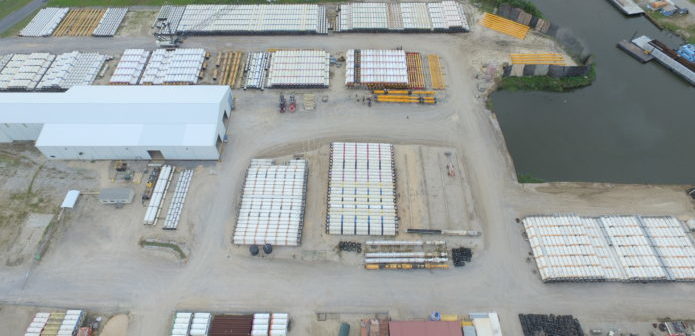DRILLING RISERS: ASK THE RIGHT QUESTIONS TO PROTECT YOUR INVESTMENT
They are the most expensive equipment on your rig – requiring proper storage, inspection and maintenance to ensure their functionality and lifespan. You most likely aren’t getting the level of service or protection that you could be if you’re using a drilling riser storage company that is in an exposed location or uses improper handling and storage practices. One could even be charging you for their convenience. Having the knowledge of what to consider when selecting a riser maintenance and storage provider will help protect your investment.
1. Where are you located?
Access from coastal areas is often the primary consideration when choosing a riser storage facility. The convenience provided by shorefront storage is obvious, but it carries increased risk than areas that are further inland.
- Natural disasters such as hurricanes or extreme weather can produce flooding and high waters, placing your most precious assets in harm’s way.
- The corrosive effect of the salty air can weaken the components and damage your drilling risers.
When these concerns are accounted for, storing risers “on the beach” carries a much greater risk than storing them further inland.
Although initial costs to transport risers further inland may be higher, there are offsetting values to consider over the long-term:
- As long as the facility has waterfront access, the option exists for risers to be transported by barge, avoiding the higher cost of truck transport.
- The land is more affordable and available as you move inland, reducing storage costs.
- The air is less salty and corrosive further inland.
- Hurricane exposure and storm risks are lower in more protected inland areas.
A good recommendation is to look for a riser facility at least 20 miles from the coast to ensure ease of transportation and accessibility while also reducing environmental risks.
2. Where and how are risers organized in storage?”
The proper storage of risers often takes additional time and resources. But when it comes to your investments, why settle for less?
Some riser facilities store risers at their own convenience – in the place and manner that is easiest for them. This can often result in many customers’ risers being stacked together or stored in multiple locations throughout the yard. Furthermore, they can often charge you for the time and expense of moving your risers in their yard. Companies such as this are passing on the cost of their own inefficiency and poor organization to you.
Instead, look for a facility that will take care of your risers the way you would – with a careful method of planning.
- Ask about hidden or unexpected fees, such as costs associated with relocating your riser on site.
- Ask if your risers will be segregated and stored separately from other customers’ risers.
You can be rest assured that your risers are in good hands by choosing a riser facility that puts your convenience first, you can feel.
3. How do your testing, maintenance, and repair programs compare?
Deepwater riser repair companies should be able to perform the full range of tests, inspections and preventive maintenance to ensure your equipment’s longevity. Make sure to ask what intervals are available and whether they include full teardown, blasting, painting and reassembly.
- What technology do you employ to preserve the risers?
- How do they handle traceability?
- Can they conduct offshore inspections?
Don’t settle for a riser storage and maintenance company that provides only some of what will be needed. Look for one that offers maintenance, robust monitoring and repair process possible.
- Look for a facility that has earned ISO 9001:2008 and API Q1 registrations for its quality management system (QMS). These certifications demonstrate that the facility’s QMS meets the relevant industry standards and can be trusted by customers.
- Consider the company’s safety record.
- What level of quality control and NDT inspectors do they employ? (Level II and III Inspectors eliminate the need for third-party inspection after installation and trained quality control / quality assurance personnel give confidence that the proper checks and balances are in place and adhered to before delivery.)
- Is the facility OEM-certified or an approved repair and maintenance vendor for your brand of riser?
- Are they certified to perform OEM repairs on your riser? By choosing a facility that has been qualified to meet OEM requirements, you can be confident that the work done on your riser will meet or exceed industry standards, now and in the future.
4. Can I inspect my risers and make sure they are being handled properly?
Assurances of company representatives are good to have, but how do you know your risers are being properly handled? Surprisingly, many facilities don’t allow you to visit and inspect the status of your risers. Look for a yard that is clean, well-organized and transparent in their services. If they are taking proper care of your risers, they will be glad to have you visit and see for yourself.
Schedule a consultation soon to find out why Deepwater Riser Services is the right choice for all your drilling riser needs.
All Media



